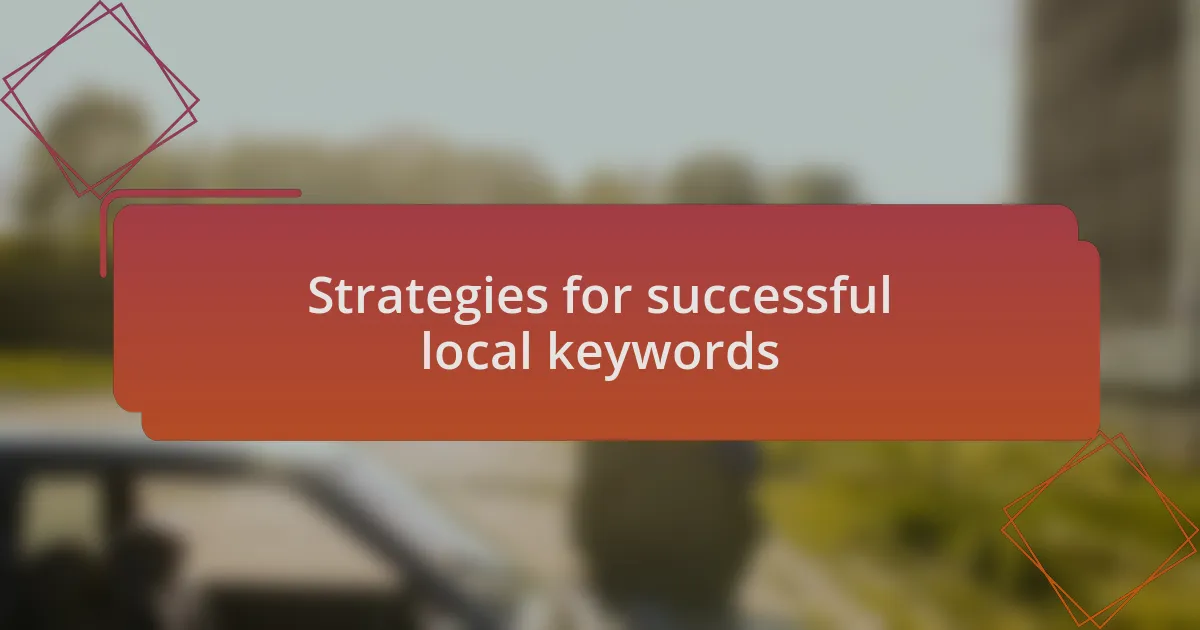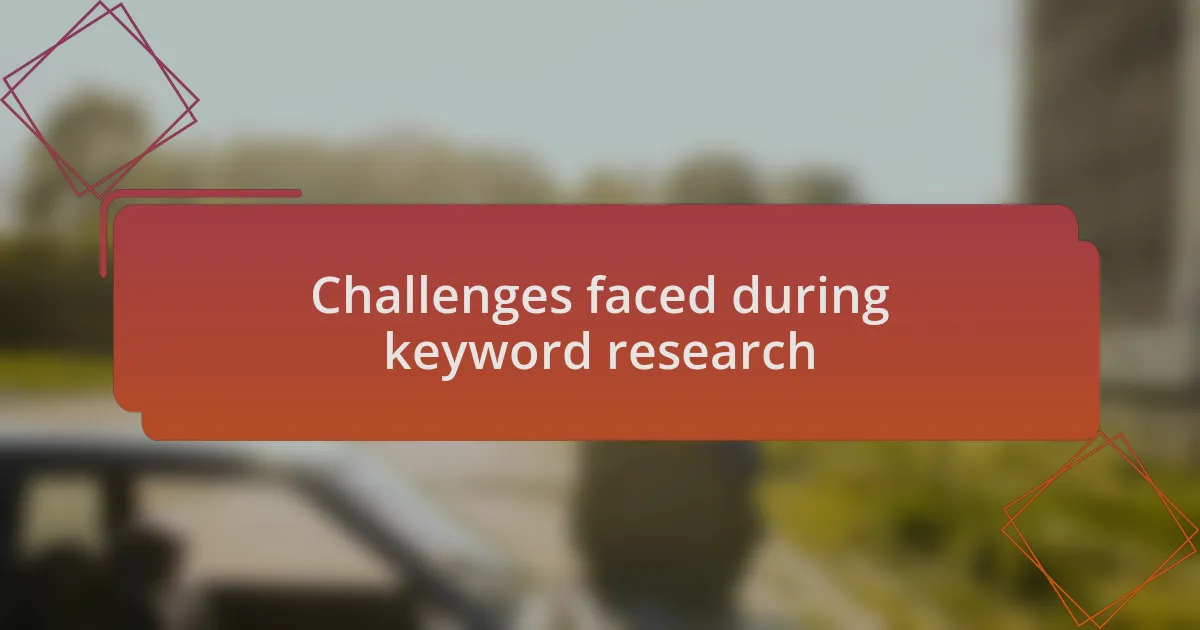Key takeaways:
- Local search engines prioritize relevance and proximity, using ranking signals like distance and user engagement to connect users with nearby services.
- Effective keyword research is essential for visibility; using specific, local phrases can significantly improve search engine ranking and customer engagement.
- Tools like Google Keyword Planner and SEMrush help identify relevant keywords and competitive strategies, while adapting to local trends enhances effectiveness in keyword targeting.
- Understanding the audience’s language and maintaining flexibility in keyword strategies are vital for success, as local preferences and search behaviors can shift over time.

Understanding local search engines
Local search engines are designed to connect users with businesses and services in their immediate vicinity. I remember a time when I was looking for a cozy coffee shop while on vacation. It amazed me how a simple search for “best coffee near me” led me to a charming local spot that I might have completely missed without that tailored search. This experience highlights how local search engines play a crucial role in our everyday decisions, helping us discover opportunities we weren’t even aware existed.
Understanding the functionality of local search engines requires appreciating how they prioritize relevance and proximity. Essentially, they rely on ranking signals such as distance, keywords, and user engagement to deliver invaluable results. Have you ever noticed how the top listings in a search often reflect real-world foot traffic? This is no accident; these engines strive to provide users with the most pertinent options based on their physical location, allowing for a more personalized experience.
Moreover, local search engines frequently integrate user-generated content, such as reviews and ratings. I’ve often found myself swayed by glowing reviews when choosing where to eat or shop. Why do we put so much stock in others’ experiences? It’s because these insights help build trust and credibility, ultimately shaping our choices. Engaging with local search engines not only gives us relevant results but also connects us to the community in a deeper way.

Importance of keyword research
When I first delved into keyword research, I realized that it’s like casting a net to catch the specific fish I want. Keywords are the phrases that potential customers are typing into search engines, and understanding them is crucial. Have you ever wondered why some businesses seem to pop up effortlessly while others remain invisible? That’s the power of effective keyword research—it can make or break your visibility.
I recall a time when I was helping a friend launch her new bakery. We spent hours researching terms like “best gluten-free cupcakes” and “local pastry shop.” It surprised us how a few strategic keywords transformed her website from almost undetectable to one of the top results in local searches. This shift not only boosted her traffic but also increased footfall in the store, ultimately leading to a thriving business. It reinforced for me how vital keyword research is—it’s not just about numbers; it’s about reaching real people with genuine needs.
Moreover, I’ve often encountered businesses that overlook the local aspect of their keyword strategy. For instance, a yoga studio might focus on generic terms instead of including “yoga classes in [city name].” By not tapping into specific local phrases, they miss out on capturing the attention of nearby enthusiasts. I can’t stress enough how understanding this nuance can elevate your business. How are you positioning your offerings in today’s digital marketplace? The right keywords can ensure you’re not just another face in the crowd but a standout choice for those seeking your services.

Tools for effective keyword research
When it comes to effective keyword research, a few tools have proven invaluable in my journey. One that I constantly rely on is Google Keyword Planner. It allows me to explore various keywords related to my niche while providing insights into search volume and competition. Just the other day, I was amazed by how a simple modification of a keyword—adding a local qualifier—opened up new avenues for traffic I had never considered before.
Another tool I find incredibly useful is SEMrush. Its comprehensive analysis not only reveals the keywords my competitors are ranking for but also helps me identify gaps in my own strategy. The first time I used SEMrush, I discovered several long-tail keywords that were surprisingly easy to rank for, and that knowledge gave me a competitive edge I hadn’t anticipated. Have you ever thought about what your competition is doing? Using such tools can provide you with a clearer picture and help you stay one step ahead.
I also can’t overlook the importance of AnswerThePublic. This interactive tool visualizes the questions people are asking around a keyword, which has helped me craft content that truly resonates with my audience. It evokes a sense of connection—when I realized that my local community was curious about “vegan options at nearby cafes,” it inspired me to create content that not only answered their queries but also established my brand as a trusted local resource. Isn’t it rewarding to know you’re meeting the needs of your potential customers head-on?

Strategies for successful local keywords
When diving into local keyword strategies, I’ve found that focusing on neighborhood-centric terms can yield impressive results. For instance, I once optimized a blog post for “best pizza in [specific neighborhood],” and the traffic surge was almost immediate. Isn’t it fascinating how a simple tweak can align your content more closely with what people in your area are searching for?
I also emphasize the value of long-tail keywords. These phrases, specifically targeting niche areas—like “affordable yoga classes for beginners in [city]”—have consistently driven more engaged visitors to my site. The last time I explored these long-tail options, I felt a thrill as I discovered low-competition keywords that perfectly matched what my target audience was actively looking for. Have you tried narrowing your focus in this way? It might be the key to unlocking local traffic you’ve been missing.
Lastly, I can’t stress enough the significance of local intent. Incorporating terms that reflect intent—such as “near me” or “in my area”—has elevated my local search visibility remarkably. A few months back, when I optimized my Google My Business profile with these phrases, I noticed a dramatic improvement in my local search inquiries. Isn’t it empowering to know that by simply aligning with what your community is searching for, you can drive growth and engagement?

Challenges faced during keyword research
When I first dipped my toes into keyword research, I was faced with the overwhelming volume of options available. It felt like standing in front of a massive library without a clear path forward. Even with a list of potential keywords, distinguishing which ones were truly relevant to my local audience proved challenging. Have you ever felt paralyzed by too many choices? I certainly have, and it took time to learn how to filter through them effectively.
Another significant hurdle I encountered was the evolving nature of search trends. Just when I thought I had a solid grasp on what my audience cared about, I’d notice shifts in their search behavior. For instance, one winter, I saw a spike in interest for local indoor activities, which completely transformed my keyword approach. It was perplexing yet exciting; adapting to these changes felt like chasing a moving target. How do you stay ahead of these trends? I learned that regularly updating my keyword strategy keeps my content fresh and relevant.
Lastly, I’ve navigated the intricacies of understanding keyword competitiveness. Sometimes a keyword that appears perfect on the surface can be dominated by much larger players. I vividly recall optimizing for a keyword that I thought would bring a flood of traffic, only to realize I was competing against well-established businesses with deep pockets. It can be frustrating, but it taught me the value of patience and adaptability. Have you experienced similar roadblocks? Embracing these challenges has allowed me to refine my approach and discover the unique phrases that resonate with my local audience.

Lessons learned from my experience
One of the key lessons I learned was the importance of understanding my audience’s unique language. During one project, I became fascinated by how different terms resonated locally. For example, I initially targeted broad keywords, but after chatting with neighbors, I realized they used more colloquial expressions. It was a lightbulb moment for me—sometimes, it’s not just about the data but about connecting with people. Have you ever found that the simplest phrases often yield the best results? I certainly did.
Another crucial takeaway hinged on the need for a flexible approach. In one instance, I had meticulously crafted a list of keywords that seemed on point, only to discover that local events changed the playing field. As community interests evolved, so did my keyword focus. I found that staying attuned to local happenings not only boosted my content’s relevance but also established my site as a trusted source of information. Isn’t it fascinating how a slight shift in perspective can lead to meaningful insights?
Finally, I came to appreciate the power of analytics in shaping my keyword strategies. After experimenting with different keywords, I invested time in analyzing the results. One month, I shocked myself by discovering a lesser-known phrase driving significant traffic, while the flashy ones fell flat. This experience helped me realize that successful keyword research is an ongoing journey, not a destination. Have you ever uncovered an unexpected gem in your own analysis? It’s those surprises that keep me engaged and constantly learning.